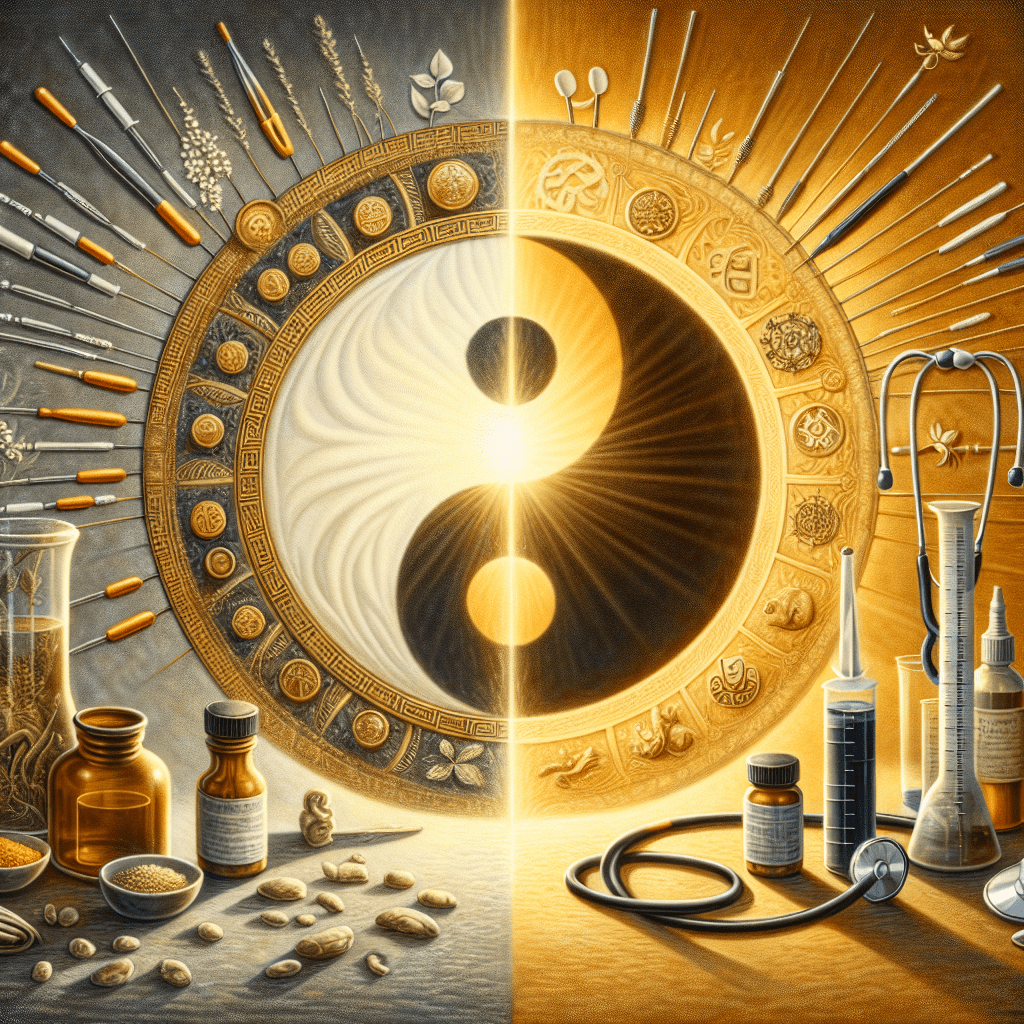Have you ever wondered why some health issues keep coming back, despite following your doctor’s orders perfectly? The answer might lie in how we approach healing. Ancient wisdom and modern science don’t have to be at odds—in fact, when they work together, something magical happens. Today, we’re exploring the fascinating intersection of holistic and functional medicine, two approaches that bridge old and new in pursuit of complete wellness.
Both holistic and functional medicine look beyond quick fixes to discover deeper healing. But which one might be right for you? Are they competing philosophies or complementary partners in your health journey? For those of us drawn to natural approaches and Eastern healing traditions, understanding these paths can transform how we care for ourselves.
Understanding the Foundations: What Sets Them Apart?
Holistic medicine isn’t just a trendy wellness concept—it’s a comprehensive approach to health with roots stretching back thousands of years. At its core, holistic medicine views the person as a whole being rather than a collection of symptoms. The word “holistic” comes from “whole,” reflecting its fundamental philosophy that our physical, mental, emotional, and spiritual dimensions are interconnected.
“Holistic medicine recognizes that a headache might not just be about pain in your head,” explains Dr. Sarah Chen, an integrative medicine practitioner. “It could be connected to stress, poor sleep, nutritional deficiencies, or emotional challenges. Treating just the pain misses the bigger picture.”
Functional medicine, meanwhile, represents a more recent evolution in healthcare. While still embracing the whole-person perspective, functional medicine adds a distinctly scientific approach. It focuses on identifying the root causes of disease through advanced testing and data analysis, looking at how your body’s systems function together.
Dr. Michael Ruscio, a functional medicine expert, describes it as “detective work for your health.” He notes, “Functional medicine asks why you’re experiencing symptoms, then works systematically to uncover the underlying dysfunctions—whether they’re related to gut health, hormones, inflammation, or other factors.”
Both approaches share a crucial philosophy: they aim to restore balance within the body. This aligns beautifully with Eastern healing traditions, which have emphasized balance for millennia. In Traditional Chinese Medicine, this balance is described as harmonizing yin and yang energies. In Ayurveda, it’s about balancing the three doshas.
Where conventional medicine might prescribe a medication to suppress symptoms, both holistic and functional medicine seek to understand why those symptoms appeared in the first place—then address those foundations directly.
Treatment Methods: Ancient Wisdom Meets Modern Science
When it comes to actual treatment approaches, holistic and functional medicine employ distinct yet complementary toolkits.
Holistic practitioners often incorporate ancient healing modalities like acupuncture, herbal medicine, massage, energy work, and mindfulness practices. These approaches, refined over centuries, work with the body’s natural healing abilities rather than against them.
Lisa Thompson, a holistic health counselor, shares: “I’ve seen remarkable transformations when clients embrace mindfulness meditation for stress-related conditions. One client with chronic migraines reduced her episodes by 70% within three months by combining herbal remedies, stress management, and dietary changes—without pharmaceutical intervention.”
Meanwhile, functional medicine leverages cutting-edge diagnostics and targeted interventions. Practitioners might order comprehensive stool analyses to assess gut health, advanced hormone panels to evaluate endocrine function, or genetic testing to understand predispositions.
“With functional medicine testing, we can see beyond what conventional blood work shows,” explains functional medicine physician Dr. James Wilson. “For example, we might discover that a patient’s fatigue isn’t just due to ‘stress’ but stems from hidden gut infections, nutrient deficiencies, or mitochondrial dysfunction. This precision allows us to create highly personalized treatment plans.”
What’s particularly powerful is when these approaches combine. Imagine addressing chronic inflammation with both anti-inflammatory herbs (holistic) and precise supplementation based on your unique nutrient deficiencies (functional). Or treating anxiety with both meditation (holistic) and targeted interventions for gut health (functional), recognizing the gut-brain connection that influences mood.
This integration offers a more complete picture than either approach alone. Eastern healing traditions have long recognized these connections—the mind-body relationship, the importance of digestion to overall health, and the need for customized approaches based on individual constitution.
Preventive Care: Stopping Problems Before They Start
Perhaps the most significant shift both holistic and functional medicine bring to healthcare is their emphasis on prevention rather than just treatment.
Functional medicine shines in its proactive approach to health maintenance. By identifying subtle imbalances before they manifest as disease, practitioners can help patients correct course early. This might involve regular comprehensive testing to track biomarkers, personalized supplementation protocols, or tailored lifestyle modifications based on genetic predispositions.
Research published in the Journal of Alternative and Complementary Medicine found that functional medicine interventions focused on prevention led to significant improvements in health outcomes and reduced healthcare costs over a five-year period. Participants reported fewer sick days and hospital visits compared to those receiving conventional care alone.
Holistic medicine takes an equally preventive but broader approach, emphasizing daily practices that maintain wellness. This includes nutrition as medicine, regular movement, stress management, adequate sleep, and spiritual or mindfulness practices.
“Eastern traditions teach us that health isn’t just the absence of disease but a state of vibrant well-being,” says Dr. Mei Lin, who integrates TCM with modern practices. “This perspective encourages patients to take an active role in their health every day, not just when problems arise.”
Both approaches recognize that prevention is far more effective—and less costly—than treating established disease. By combining functional medicine’s precise testing with holistic medicine’s lifestyle wisdom, you can create a powerful preventive strategy tailored to your unique needs.
For example, someone with a family history of heart disease might use functional medicine to track inflammatory markers and optimize cholesterol particle size, while simultaneously adopting holistic practices like a Mediterranean diet, stress management, and community connection—all factors shown to support cardiovascular health.
The Patient-Centered Revolution
Perhaps the most revolutionary aspect shared by both holistic and functional medicine is their deeply patient-centered approach. Unlike the often rushed conventional medical visit, both philosophies prioritize spending time with patients, listening to their stories, and recognizing them as the experts on their own experience.
“The therapeutic relationship itself becomes a healing tool,” observes Dr. Rachel Goldman, who practices integrative medicine. “When patients feel truly heard and participate actively in their care plan, healing accelerates. This isn’t just anecdotal—research confirms that patients who participate in shared decision-making have better outcomes.”
This patient-centered approach parallels Eastern healing traditions, where the relationship between healer and patient has always been central. In these traditions, the practitioner serves as a guide, helping the individual restore balance rather than imposing treatments from above.
Functional medicine enhances this relationship with data-driven insights. Patients often report feeling empowered when they can see objective measurements of their progress. As one patient shared: “Seeing my inflammatory markers decrease over time gave me concrete proof that my lifestyle changes were working. It kept me motivated when the going got tough.”
This personalized care concept is at the heart of HerbalsZen’s approach as well. By integrating Eastern wisdom with AI technology, HerbalsZen creates uniquely individualized health plans. Their EASTCHI AI analyzes your constitutional type through Five Element Theory, providing customized nutrition and lifestyle recommendations that honor both ancient wisdom and your modern life circumstances.
As Dr. Michael Pollan famously observed, “The patient, not the condition, is the entity to be healed.” Both holistic and functional medicine embrace this truth, offering a refreshing alternative to one-size-fits-all healthcare.
Finding Your Path: Integrating the Best of Both Worlds
So which approach is truly best for healing your whole being—holistic or functional medicine?
The answer might surprise you: it’s not about choosing one over the other, but about intelligently integrating both.
Imagine combining the comprehensive testing and precision of functional medicine with the lifestyle wisdom and spiritual awareness of holistic approaches. This integration creates a healthcare experience that addresses not just your physical systems but your entire being—body, mind, spirit, and community.
Dr. Andrew Weil, a pioneer in integrative medicine, suggests: “The future of medicine lies not in choosing between approaches but in thoughtfully combining them. We need both the wisdom of traditional healing systems and the innovations of modern science.”
This integrated approach might look like:
- Using functional medicine testing to identify specific imbalances, then addressing them with both targeted supplements and traditional healing modalities
- Combining data-driven nutrition plans with the ancient wisdom of seasonal eating and constitutional considerations
- Addressing stress through both mindfulness practices and science-based interventions for the HPA axis (your body’s stress response system)
- Recognizing both the biochemical and energetic dimensions of health
For health-conscious individuals drawn to Eastern healing philosophies, this integration offers a particularly compelling path. It honors the ancient wisdom that views humans as part of nature, while embracing the precision tools that modern science provides.
As one patient who embraced this integrated approach shared: “After years of being dismissed by conventional doctors, functional medicine gave me answers about why I was feeling unwell. But it was holistic practices that helped me implement those insights in a way that felt sustainable and nourishing to my spirit, not just my body.”
Embracing the Best of Ancient and Modern for True Healing
The journey to optimal health isn’t about choosing between ancient wisdom and modern innovation—it’s about creating a thoughtful synthesis that addresses all dimensions of your being.
Both holistic and functional medicine offer valuable perspectives on healing. Holistic medicine reminds us that we are whole beings, not collections of separate parts. Functional medicine provides the precise tools to understand our unique biochemical makeup and address imbalances at their source.
When these approaches work together, supported by both timeless wisdom and cutting-edge science, they create a healthcare experience that truly honors your complexity as a human being.
This integrated perspective aligns perfectly with HerbalsZen’s philosophy of bridging Eastern healing traditions with modern technology. Their approach recognizes that true healing comes not from choosing either ancient or modern, but from the wisdom to combine them thoughtfully.
As you consider your own health journey, remember that you don’t have to choose just one path. The most powerful healing often happens at the intersection of ancient wisdom and modern knowledge—where we honor both where medicine has been and where it’s going. This integrated approach might just be the key to healing your whole being, not just treating your symptoms.



